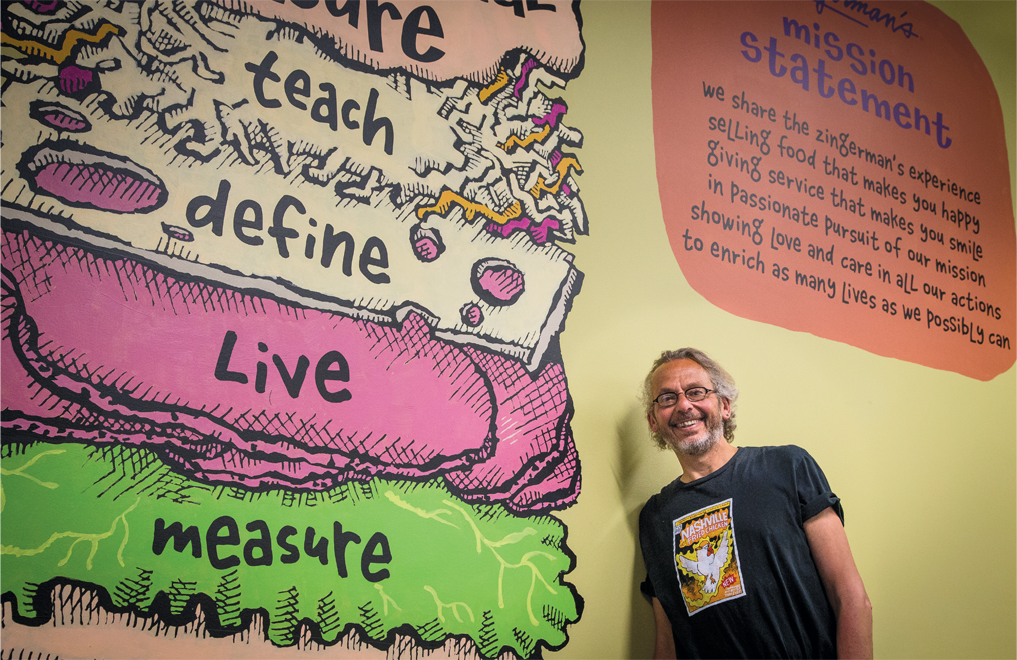Ari Weinzweig: Writer, Teacher and Zingerman’s Co-founder
Ari Weinzweig loves books.
Of course, it’s the ideas and stories contained in them that really fire up the co-founder—along with Paul Saginaw—of the Zingerman’s Community of Businesses (ZCoB), the Ann Arbor group of enterprises that include Zingerman’s Deli, the Roadhouse, the Bakehouse, ZingTrain, Miss Kim restaurant in Kerrytown and a dozen others. But actual books, whether he’s reading or writing them, play a huge part in his life.
He’s easy to spot: a tall, lanky guy with curly hair, black jeans and T-shirt and espresso-brown eyes behind glasses, often sitting at one of his ad hoc offices—a free table at the Roadhouse or at Zingerman’s Southside—and usually with at least a book or two nearby.
“Right now, I’m reading one by Daniel Pink, and he’s got some pretty convincing stuff about how we need more sleep.” He smiles. “He’s got a great argument, but I’m also resisting the data.”
Weinzweig and resistance to data, and authority of pretty much any kind, go way back. Books—stacks of them, along with papers, letters and tracts—helped reinforce his convictions. As a Russian history major at the University of Michigan, he discovered the Labadie Collection, one of the foremost archives of anarchist writings in the world. There, through their writings, he got to know Emma Goldman, Mikhail Bakunin and a dozen other anarchists whose names he rattles off as if they’re part of his family tree.
But prior to teaming up with Saginaw to open Zingerman’s Deli— on March 15, 1982—Weinzweig’s initial attempts to introduce anarchist ideas into the business world “taught me a great deal— mostly about how to screw up.” Leaving people alone to do the right thing resulted in a leadership vacuum.
So he read, learning from literally hundreds of books in his limited spare time. He listened to and argued with Saginaw. He spent hours that added up to weeks and months and years conversing with future partners Maggie Bayless and Frank Carollo, and with countless employees and customers.
And 11 years later, by 1993, the Zingerman’s Deli was an unqualified success. But what was next? From the get-go, franchises—the typical corporate American next step for runaway hit eateries—were a non-starter for either Weinzweig or Saginaw. More intense collaboration and late nights ensued, detailed in the introductory chapters for some of the books in the Zingerman’s Guide to Good Leading Series (currently consisting of four volumes, with more slated).
By 1994, with input from dozens of employees and stakeholders, the team released “Zingerman’s 2009.” It’s surprisingly short, given the tremendous energy that went into creating the vision for the company’s future; just nine pages reprinted at the end of Building a Great Business, Part 1 in the Good Leading series (the equally succinct sequel, “Zingerman’s 2020,” follows). Stylistically it’s classic Ari Weinzweig, as loose-limbed as the writer’s physique. He honed his writing chops in both articles and books, from the food-specific ones like The Zingerman’s Guide to Better Bacon to the 500-pluspage Zingerman’s Guide to Good Eating, featuring, according to Publishers Weekly, Weinzweig’s “mouthwatering brand of fanaticism.”
Yet the books in the Good Leading Series are equally accessible. Weinzweig doesn’t lecture; he tells stories. The series reveals the “secrets” (Weinzweig’s quotation marks) discovered and implemented by him, Saginaw, Bayless and the now 20+ partners in ZCoB, as well as the thousands of Zingerman’s employees over the years, including 200+ staff who currently own a community share of the business.
In fact, the ZCoB represents nothing less than a revolution in American small business—and it started with a willingness to flip the corporate American ethos on its bean-counting head. “The typical work environment is compete, compete, compete,” says Weinzweig. “We say, Collaborate. Breathe. Respect.”
He continues to challenge readers and business owners, speaking and teaching around the U.S. and the world. And in Part 4 of the Good Leading Series, The Power of Beliefs in Business, he challenges readers to upend long-held convictions in and out of work.
For Weinzweig, great ideas don’t stay in neat boxes or between book covers. They’re allowed to follow their own path, as anarchic as you please. He actively encourages people to read his books in any order or to buy individual chapters online or in printed pamphlet form. Zingerman’s itself designs the books, has them printed in town and distributes them on their own website—what he thinks of as the “publishing equivalent of farm to table.”
Perhaps most importantly, he himself has turned into an open book that vividly illustrates the philosophy he’s outlined over thousands of pages of writing.
Emily Duffelmeyer, a former Zingerman’s employee and current owner of Jean Jean Vintage in Lansing, remembers clearing tables one afternoon on the front porch of the Next Door. “I looked up to see Ari crossing Detroit Street. Before he stepped up onto the curb, he stooped over and picked up a paper cup in the gutter. How many people crossing the street that day saw that cup and didn’t pick it up? Probably a lot. Watching Ari pick it up—not realizing that I or anyone else was watching—communicated everything to me about leadership, service and the Zingerman’s brand.tt
“I hope that I can be the leader who picks up the proverbial cup— who chooses to do the thing that everyone sees, but no one wants to do—when I see it, too.”
Learn more at Zingermans






